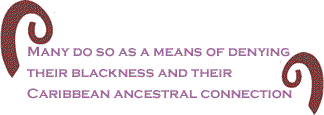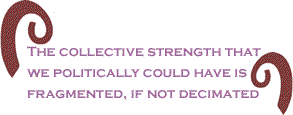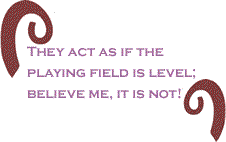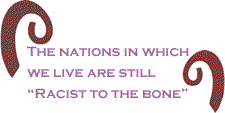Over
the past few years I have written a number of open letters
to �Mis Paisanos y Paisanas.� In all honesty most of them,
if not all, have been directed to those of �African Ancestry.�
 To
be more specific they were addressed to those Panamanians
whose forefathers journeyed to Panama
for the construction of the railroad (mostly Jamaicans)
and the canal.
To
be more specific they were addressed to those Panamanians
whose forefathers journeyed to Panama
for the construction of the railroad (mostly Jamaicans)
and the canal.
I
make this �distinction� - even though accurately there
is none - because I have heard some of my brothers and
sisters proclaim that they are not �Africans.� When this
I hear, I have often cringed and muttered softly- generally
to myself- especially if I do not want to engage in any
prolonged non-productive verbal fisticuffs: �How ignorant!�
I say.� Condemned are they to eternal servitude to the
sons and daughters of those who enslaved, abused and maligned
our people.� Ignorance is rarely bliss!
This
piece, thanks to this publication, is in lieu of another
letter.
As
in my previous writings I make the following statement
which is made not as an apology but for ideological specificity
and to clearly position myself in the debate of �Who are
we?� Nothing else!
Note,
then, that I write from the position of one who defines
himself as an �African� whose forefathers were enslaved,
brought in chains to the Caribbean islands where they
were subdued and their past knowledge of selves were obliterated
as they were indoctrinated into a European value system.
They gave birth to my great-great grandparents and who
in turn gave birth to my great grandparents whose son
and daughter came to Panama
where I was born and raised. I became a �man� on the teeming
streets of Chicago and of Brooklyn where I learned who I am
and where I believe that we, as a people, ideologically
speaking, need to be. We are an African people! Anything
I say or write comes from that perspective. As they say
in Spanish �Punto!�
Recently
there has been much talk of us being �Afro-Latinos�. While,
in my view, this is an expression that recognizes our
�African� heritage I am concerned that it could be - operative
words �could be� - used, if we are not collectively very,
very careful, as an instrument of fragmentation of any
movement towards the development of African Diasporan
Solidarity.  Here
is my concern: If one defines as �Latinos� anyone who
first saw light in what is a �Latino� county then all
�black people� born under such circumstances are �Latinos�.
If however, the notion is promoted and promulgated that
as such their interests as a people is different from
other people of African ancestry born elsewhere since
they are of a different �nationality� then Garvey�s concept
of �One Race, One Destiny� is fractured. I agree with
Garvey�s dictum.
Here
is my concern: If one defines as �Latinos� anyone who
first saw light in what is a �Latino� county then all
�black people� born under such circumstances are �Latinos�.
If however, the notion is promoted and promulgated that
as such their interests as a people is different from
other people of African ancestry born elsewhere since
they are of a different �nationality� then Garvey�s concept
of �One Race, One Destiny� is fractured. I agree with
Garvey�s dictum.
I
make this point because from my perspective, too many
of our �paisanos/as� of dark hue - as happened in the
last Panamanian census - suffer from the �Yo no soy Africano
� soy Panameno� syndrome, failing to recognize that they
are indeed �both.� Sadly, many do so as a means of denying
their blackness and their Caribbean
ancestral connection. They may dance the tamborito or
wear a mean montuno hat or a pollera at every national
celebration, as they generally do, but as Felipe Luciano
formerly of the Last Poets, the Young Lords and yes, a
former student of mine, warns us in his opening remarks
on �You Tube� before the reading of his poem �Jibaro�
My pretty Nigger,� which I strongly suggest you try to
see. I will paraphrase his opening remarks:
It
is that movement that concerns me. We cannot let them
divide us. Some may ask �what is Carlos talking about?...
That is not really important.� Others may simply say:
�It does not matter what they call themselves as long
as they do what needs to be done.� To me it does matter!
Here is an example. Given the demographic shift here in
New York City,
new political lines are being re-drawn. These are the
lines from which political �leaders� are elected. As this
is being written - the lines have not yet been drawn -
there is much discussion of carving up Brooklyn into a
seat for Latinos, a seat for African-American, a seat
for Caribbean people, and a seat
for Haitians. If we assume that lines so drawn does, in
effect, produce a �Latino� leader; an �African-American�
leader; a Caribbean �leader� and a Haitian �leader,� with
each vying to meet the needs of his or her �constituency�
then the collective strength that we politically could
have is fragmented, if not decimated. One�s �Latino� roots,
�African-American� roots, �Caribbean� roots or �Haitian�
roots will take precedence over the commonality of our
�Africaness.�
It
seems to me that some of us may be suffering from selective
amnesia and have �forgotten� that one of the �tricks�
that has been played on us, as a people, by the European
is the historical �divide and conquer� rule for retaining
economic power and control. Whenever they, the Europeans,
are in the minority, but still wield the derivative powers
of their forefathers, they attempt, often with great success,
to split the majority. They act as if the playing field
is level; believe me, it is not! From our arrival in the
Americas they have held the reins of power.  It
is they who have ruled and controlled the nations where
once the Native Americans lived with dignity and often
in peace; developed civilizations e.g. The Mohawks, the
Seneca, the Mayas, the Incas, the Aztecs and those �native
nations� that existed on the Isthmus of Panama to name
only a few. Today, they are decimated and relegated to
�reservations� and �Comarcas� by the European and their
offspring whether pure or hybrid.
It
is they who have ruled and controlled the nations where
once the Native Americans lived with dignity and often
in peace; developed civilizations e.g. The Mohawks, the
Seneca, the Mayas, the Incas, the Aztecs and those �native
nations� that existed on the Isthmus of Panama to name
only a few. Today, they are decimated and relegated to
�reservations� and �Comarcas� by the European and their
offspring whether pure or hybrid.
Tragically,
people of African ancestry have also been marginalized
and relegated to urban ghettoes such as the �arrabales�
in many of our alleged �Latino� nations.
Please
understand, as I said at the offset, the concept of Afro-Latino,
by definition, recognizes one�s African heritage and it
is one that I can fully embrace, but I am fearful that
the �Latino� portion of the ideological construct could
take primacy over the �African� and could be become preeminent,
the rallying point of a movement that could place �nationality�
over race. If however those at the forefront of the �Afro-Latino�
movement fully recognize the symbiotic relationship and
nature between the �African� and the �Latino� elements
that comprise the ideological construct then, as we said
in the 60s and 70s �Straight ahead� or in Spanish �Pa�lante�
From
my perspective we need to develop an �African Diasporan
Solidarity Movement,� one that is founded on Garvey�s
concept of �One Race one Destiny.� It should be one that
recognizes, respects and responds to the reality of the
many elements that comprises the African Diaspora without
sacrificing our heritage for the �safety� of the nation
where we may have been born.  Without
exception, in all those nations where Africans were born,
- this includes the U.S.A.
and Spain
and all of the European nations - those who sit at the
pinnacle of power and continue to wield its baton are
Europeans or of European extraction. Sadly, their social,
economic, and cultural institutions are still racist in
nature. If they were not so, there would not be a need
of a movement of any kind. As I write these words a thought
came to mind which caused me to smile. Trinidadians have
a saying �Trini to the bone.� The nations in which we
live are still, in my opinion. �Racist to the bone.�
Without
exception, in all those nations where Africans were born,
- this includes the U.S.A.
and Spain
and all of the European nations - those who sit at the
pinnacle of power and continue to wield its baton are
Europeans or of European extraction. Sadly, their social,
economic, and cultural institutions are still racist in
nature. If they were not so, there would not be a need
of a movement of any kind. As I write these words a thought
came to mind which caused me to smile. Trinidadians have
a saying �Trini to the bone.� The nations in which we
live are still, in my opinion. �Racist to the bone.�
Finally,
the African Diasporan Solidarity Movement� would have
as its primary mission the political, economic, social,
and cultural transformation of those nations wherein we
reside who continue with their present modus operandi.
It would raise its collective voice and use its economic
and human resources in the pursuit, defense and maintenance
of the interests of all those movements that adhere to
the principle of �one race one destiny� and functionally
accept the centrality of being African, whether they speak
English, French, Spanish, Dutch, Portuguese or German
and yes, even Russian and Chinese.
Within
the movement there will be disagreements and perhaps contradictions.
However, I believe that if we believe as Dr. John Henrik
Clarke once said and I paraphrase, �The role of the African
academic and intellectual (I add socio-political activists)
is to keep African people on the Planet,� then these differences
and even contradictions could be resolved. Our mission
is to avoid re-enslavement, whether physical or psychological
and to create, if possible, what Dr. King called �A Beloved
Community.�  To
achieve this we must have the necessary power to reach
that end, as Malcolm once said, �By any means necessary�
for as Frederick Douglass, the Black abolitionist, told
us so many years ago, �Power concedes nothing without
a demand; it never has and it never will� Without struggle
there is no progress.�
To
achieve this we must have the necessary power to reach
that end, as Malcolm once said, �By any means necessary�
for as Frederick Douglass, the Black abolitionist, told
us so many years ago, �Power concedes nothing without
a demand; it never has and it never will� Without struggle
there is no progress.�
For
me Race trumps nationality!
BlackCommentator.com Guest Commentator, Carlos E. Russell, PhD is Professor Emeritus C.U.N.Y. - Brooklyn College. In the sixties, he served as an Associate Editor of the Liberator magazine. As such, he was one of the first to interview Malcolm X after he left the Nation. He is best remembered as the founder of Black Solidarity Day in New York in 1969 and as the Chair of the Black Caucus of the Conference on New Politics in 1967. In addition, he was a consultant to Dr.Martin Luther King Jr. during the planning for the Poor Peoples March. Excerpts of his participation can be seen in Citizen King  and Eyes on the Prize (PBS Mini Series Boxed Set). Born
in the Republic of
Panama he has served as
that country's representative
to the U.N
and the O.A.S.
with the rank
of Ambassador. He has
also served as the
nightly host of
�Thinking it Through�
a talk show that was
aired on WLIB in New
York. He is a playwright
and poet as well.
Click here
to contact Dr. Russell.
and Eyes on the Prize (PBS Mini Series Boxed Set). Born
in the Republic of
Panama he has served as
that country's representative
to the U.N
and the O.A.S.
with the rank
of Ambassador. He has
also served as the
nightly host of
�Thinking it Through�
a talk show that was
aired on WLIB in New
York. He is a playwright
and poet as well.
Click here
to contact Dr. Russell.


